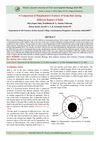 31 citations,
August 1975 in “Journal of Pharmaceutical Sciences”
31 citations,
August 1975 in “Journal of Pharmaceutical Sciences” Minoxidil metabolizes similarly in monkeys and humans, but differently in dogs and rats.
 30 citations,
November 2008 in “Facial Plastic Surgery”
30 citations,
November 2008 in “Facial Plastic Surgery” The conclusion is that the best approach for treating Female Pattern Hair Loss is a combination of different treatments.
 25 citations,
September 2010 in “Journal of Cutaneous Medicine and Surgery”
25 citations,
September 2010 in “Journal of Cutaneous Medicine and Surgery” The study found that Central Centrifugal Cicatricial Alopecia mainly affects middle-aged African descent women, is linked to certain hair care practices and genetics, and often goes undiagnosed for years.
 21 citations,
April 2019 in “Endocrinology and Metabolism Clinics of North America”
21 citations,
April 2019 in “Endocrinology and Metabolism Clinics of North America” Transgender patients need proper skin care, especially when undergoing hormone treatments, to manage issues like acne and hair loss.
 15 citations,
January 2019 in “International Journal of Women's Dermatology”
15 citations,
January 2019 in “International Journal of Women's Dermatology” Early treatment helps stop hair loss in women of color.
 14 citations,
September 2017 in “Clinics in Dermatology”
14 citations,
September 2017 in “Clinics in Dermatology” Skin diseases linked to insulin resistance should be managed to prevent diabetes and reduce heart disease risk.
 7 citations,
January 2015 in “Current problems in dermatology”
7 citations,
January 2015 in “Current problems in dermatology” Hair loss can be caused by stress, infections, drugs, and various diseases, with treatment depending on accurate diagnosis.
 6 citations,
March 1999 in “Journal of pediatric health care”
6 citations,
March 1999 in “Journal of pediatric health care” The document emphasizes the need for primary care providers to understand and care for African American children's hair and skin to boost their self-esteem.
 6 citations,
March 2020 in “Jornal de Pediatria”
6 citations,
March 2020 in “Jornal de Pediatria” Inflammatory skin conditions are the most common in Brazilian children, with atopic dermatitis being the top issue.
 4 citations,
June 2022 in “Clinical, cosmetic and investigational dermatology”
4 citations,
June 2022 in “Clinical, cosmetic and investigational dermatology” The new SFS Scale predicts hair transplant difficulty using hair and skin types, with thick skin and coily hair being hardest to work with.
 3 citations,
August 2010 in “Anais brasileiros de dermatologia/Anais Brasileiros de Dermatologia”
3 citations,
August 2010 in “Anais brasileiros de dermatologia/Anais Brasileiros de Dermatologia” A rare genetic disease caused severe, worsening hair loss from early childhood with poor treatment results.
 2 citations,
January 2011 in “Elsevier eBooks”
2 citations,
January 2011 in “Elsevier eBooks” Early treatment of acne is crucial to prevent scarring and psychological effects.
 1 citations,
September 2023 in “Dermatology and therapy”
1 citations,
September 2023 in “Dermatology and therapy” More research is needed to find the best treatment for dissecting cellulitis of the scalp.
 1 citations,
October 2018 in “InTech eBooks”
1 citations,
October 2018 in “InTech eBooks” The document concludes that treatments for cicatricial alopecia are not well-supported by evidence, but hair transplantation shows more predictable and satisfactory results.
 1 citations,
July 2016 in “British Journal of Dermatology”
1 citations,
July 2016 in “British Journal of Dermatology” Men with a certain type of hair loss often use facial moisturizers, and a specific antibiotic treatment may help another hair condition.
 1 citations,
July 2012 in “Springer eBooks”
1 citations,
July 2012 in “Springer eBooks” The document concludes that more research is needed to better understand and treat scarring hair loss conditions.
 1 citations,
October 1984 in “Clinics in dermatology”
1 citations,
October 1984 in “Clinics in dermatology” People distressed by minor skin changes should consult dermatologists with cosmetic expertise, and a public Cosmetic Dermatology Service with mental health support is recommended.
 1 citations,
November 2017 in “Skin appendage disorders”
1 citations,
November 2017 in “Skin appendage disorders” Ingrown hairs are a common feature in scarring alopecias due to follicular damage.
 January 2024 in “Burns and trauma”
January 2024 in “Burns and trauma” The skin microbiome helps heal wounds and can be targeted to improve healing.
 November 2023 in “bioRxiv (Cold Spring Harbor Laboratory)”
November 2023 in “bioRxiv (Cold Spring Harbor Laboratory)” Disrupted cholesterol production impairs hair follicle stem cells, leading to hair loss.
 January 2023 in “European endocrinology”
January 2023 in “European endocrinology” People with alopecia have a higher risk of thyroid cancer.
 December 2022 in “Kristu Jayanti Journal of Core and Applied Biology (KJCAB)”
December 2022 in “Kristu Jayanti Journal of Core and Applied Biology (KJCAB)” Scalp hair characteristics vary across different regions of India and can help identify a person's origin.
 January 2020 in “Annals of the Academy of Romanian Scientists Series of Medicine”
January 2020 in “Annals of the Academy of Romanian Scientists Series of Medicine” Folliculitis decalvans is a rare skin disease causing hair loss and requires personalized treatment.
 January 2019 in “ARC journal of pharmaceutical sciences”
January 2019 in “ARC journal of pharmaceutical sciences” Acne can be managed with various treatments and requires psychological support due to its emotional impact.
 January 2018 in “Springer eBooks”
January 2018 in “Springer eBooks” Athletes need effective management of skin disorders for their performance and well-being.
 January 2018 in “Springer eBooks”
January 2018 in “Springer eBooks” Gender affects hair and scalp characteristics, with differences in hormone responses, graying patterns, and trace metals.
 January 2017 in “Springer eBooks”
January 2017 in “Springer eBooks” The document explains various skin conditions and their treatments.
 November 2015 in “European Journal of Inflammation”
November 2015 in “European Journal of Inflammation” Cicatricial alopecia, a permanent hair loss condition, is mainly caused by damage to specific hair follicle stem cells and abnormal immune responses, with gene regulator PPAR-y and lipid metabolism disorders playing significant roles.

Skin changes throughout life, from development before birth to aging effects like wrinkles, influenced by both genetics and environment.
 January 2007 in “Dermatologic Surgery”
January 2007 in “Dermatologic Surgery” A new scalp surgery technique leads to significantly thinner scars.






























